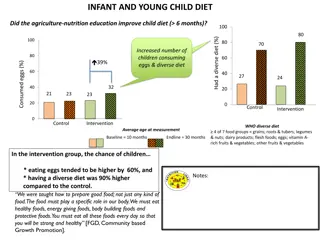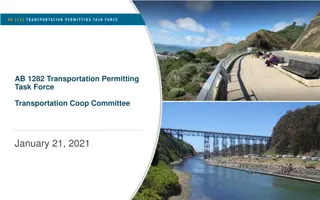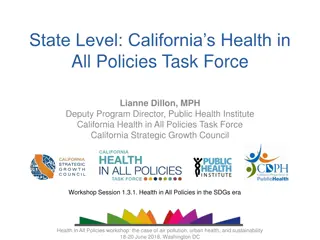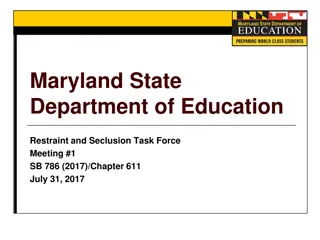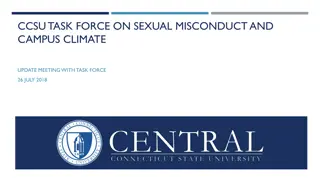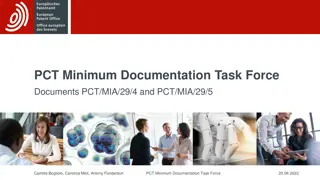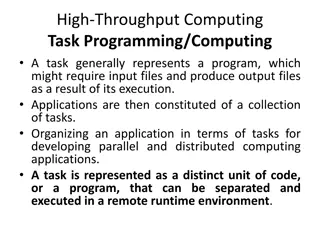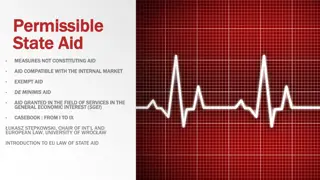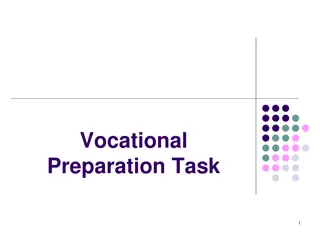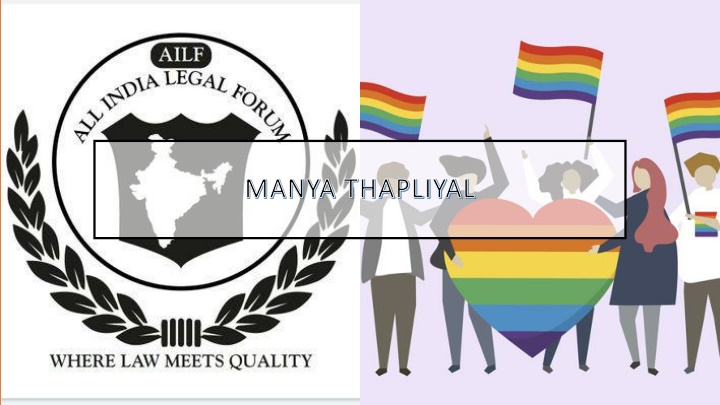
The Transgender Persons (Protection of Rights) Act 2019
Explore the key provisions of the Transgender Persons (Protection of Rights) Act 2019, which aims to protect the rights of transgender individuals in India. Learn about the prohibition of discrimination, rights of residence, employment, education, healthcare, and more. Understand the significance of this act in promoting inclusivity and equality for the transgender community.
Download Presentation

Please find below an Image/Link to download the presentation.
The content on the website is provided AS IS for your information and personal use only. It may not be sold, licensed, or shared on other websites without obtaining consent from the author. If you encounter any issues during the download, it is possible that the publisher has removed the file from their server.
You are allowed to download the files provided on this website for personal or commercial use, subject to the condition that they are used lawfully. All files are the property of their respective owners.
The content on the website is provided AS IS for your information and personal use only. It may not be sold, licensed, or shared on other websites without obtaining consent from the author.
E N D
Presentation Transcript
MANYA THAPLIYAL MANYA THAPLIYAL
Transgender Act 2019 High need to make it inclusive
INTRODUCTION The Transgender Persons, protection of rights bill 2019 was introduced in Lok Sabha by the Minister for Social Justice and Empowerment, Mr. Thawar Chand Gehlot. Bill defines a transgender person as one whose gender does not match the gender assigned at birth. It includes trans-men and trans-women, persons with intersex variations, gender-queers, and persons with sociocultural identities, such as kinnar and hijra. Bill was passed by parliament on November 26, 2019. Trans community has vehemently rejected the bill on the grounds of violating their fundamental rights
What does the What does the act consist? act consist?
Prohibition against discrimination: The act prohibits the discrimination against a transgender person, including denial of service or unfair treatment in relation to: 1. Education 2. Employment 3. Healthcare 4. Access to, or enjoyment of goods, facilities, opportunities available to the public 5. Right to movement; 6. Right to reside, rent, or otherwise occupy property; 7. Opportunity to hold public or private office; and 8. Access to a government or private establishment in whose care or custody a transgender person is.
Right of residence: Every transgender person shall have a right to reside and be included in his household. If the immediate family is unable to care for the transgender person, the person may be placed in a rehabilitation centre, on the orders of a competent court. Employment: No government or private entity can discriminate against a transgender person in employment matters, including recruitment, and promotion. Every establishment is required to designate a person to be a complaint officer to deal with complaints in relation to the Act. Education: Educational institutions funded or recognised by the relevant government shall provide inclusive education, sports and recreational facilities for transgender persons, without discrimination.
Health care: The government must take steps to provide health facilities to transgender persons including separate HIV surveillance centres, and sex reassignment surgeries. The government shall review medical curriculum to address health issues of transgender persons and provide comprehensive medical insurance schemes for them. Certificate of identity for a transgender person: A transgender person may make an application to the District Magistrate for a certificate of identity, indicating the gender as transgender . A revised certificate may be obtained only if the individual undergoes surgery to change their gender either as a male or a female. Welfare measures by the government: The Bill states that the relevant government will take measures to ensure the full inclusion and participation of transgender persons in society. It must also take steps for their rescue and rehabilitation, vocational training and self-employment, create schemes that are transgender sensitive, and promote their participation in cultural activities.
Offences and penalties: The Bill recognizes the following offences against transgender persons: (i) forced or bonded labour (excluding compulsory government service for public purposes), (ii) denial of use of public places (iii) removal from household, and village (iv) physical, sexual, verbal, emotional or economic abuse. Penalties for these offences vary between six months and two years, and a fine.
HISTORY OF THE ACT Transgender community has been betrayed in the past and consistently. In 2014, Transgender Rights Bill was introduced by a private member named Tiruchi Siva. It was passed by the Rajya Sabha in 2015 and gave a ray of hope that the supreme court verdict would be followed by legislative action. Instead what followed was crystal clear retraction of the claims made, and assurance given. A series of bills beginning with the 2016 bill followed by the 2018 bill, were but a death knell on the culmination of hopes of the community. Transgender community took over public spaces by coming out in thousands opposing the law which was to be compelled on them.
2018 version of the Transgender bill sailed through the Lok Sabha. Eventually the bill lapsed and there was a sense of relief amongst the community. They knew it would be short lived. Since then state sanctioned attack against the community gained a renewed momentum. Police attacked trans persons, detained and unlawfully arrested them. Due to the lack of legal protection for the community, violations against them were overlooked. On 10th of July 2019 cabinet passed the Transgender persons bill 2019. The bill was not made available to the affected communities and the public at large till the morning it was tabled in the Lok Sabha.
CRITI The bill which aims to protect the rights of transgender people was drafted and passed without consulting anyone from the community. No one from the community was asked about their needs and requirements. Assumptions were based on stereotypes. As per the bill, transgender needs to approach district magistrate to obtain a certificate stating that they are transgender. Only after this they will be able to change their gender to either male or female on government issued identification cards. 1. This is not what all transgender want 2. Its an expensive procedure which many of them will not be able to afford
3- what if they do not have the required documents since many of them run away from their house. How will they get the certificate of self identification. Bill is over all vague. It does not precisely mention regarding the documents required for self identification. 4- It does not state clear definition regarding how the District Magistrate will examine the person or their documents. 5- It is a violation of privacy The bill does not specify the kind of surgery they are expecting because there is more than one type. This contradicts the 2014 judgement NALSA (National Legal Services Authority of India) by the supreme court. It gave transgender people the right to self identity and did not mandate surgery.
The fact that bill conflates transgender people with intersex people proves that it was not thought comprehensively and has been made with adequate knowledge. Not every intersex person defines as transgender, and not every transgender person is intersex. As it states that a person identity as a transgender is valid whether they have undergone sex reassignment surgery or not. This directly contradicts the point having to receive a certificate from a district magistrate, proving that they have undergone surgery. Bill makes sexual abuse against a transgender person a punishable offence. However it fails to clearly define what constitutes sexual abuse. In case of a cisgender woman, her rapist once convicted will be sentenced to a minimum of seven years or jail term but when it comes to a transgender person the minimum sentence is six months and can extend to minimum of just two years.
This differentiation not only shows the community is being treated partially but also indicates the fact that government does not think the impact of sexual abuse on trans person is equally heinous and impactful as on a cisgender women. While mentioning government aid in education and healthcare does not specify the manner, they will aid the transgender community. Will fees and medical bills be subsided? Will they be free? There is no clarity on this aspect. If the family of a transgender person is unable to take care of them, the person may be placed in a rehabilitation center with orders from the court. This denies the right of a person to join other transgender communities such as hijra community. The bill does not have any provisions to apprehend those who discriminate against bully or harass transgender people at educational institutes , workplace or anywhere else. The bill does no mention of things like marriage rights, adoption rights, property rights, social security or pension. This deprives the community from their fundamental rights.
This power point presentation aims and comprehensively includes loopholes in the Transgender 2019 Act. We have seen time and again they have been betrayed in all sorts of form. In 21st century when the country is progressing in all aspects, it is equally important to make this act progressive as well rather than regressive. After all it is the duty of a nation to not make it citizens feel appalled. It is high time we make the bill inclusive rather than exclusive and make our fellow citizens equally loved and accepted.




